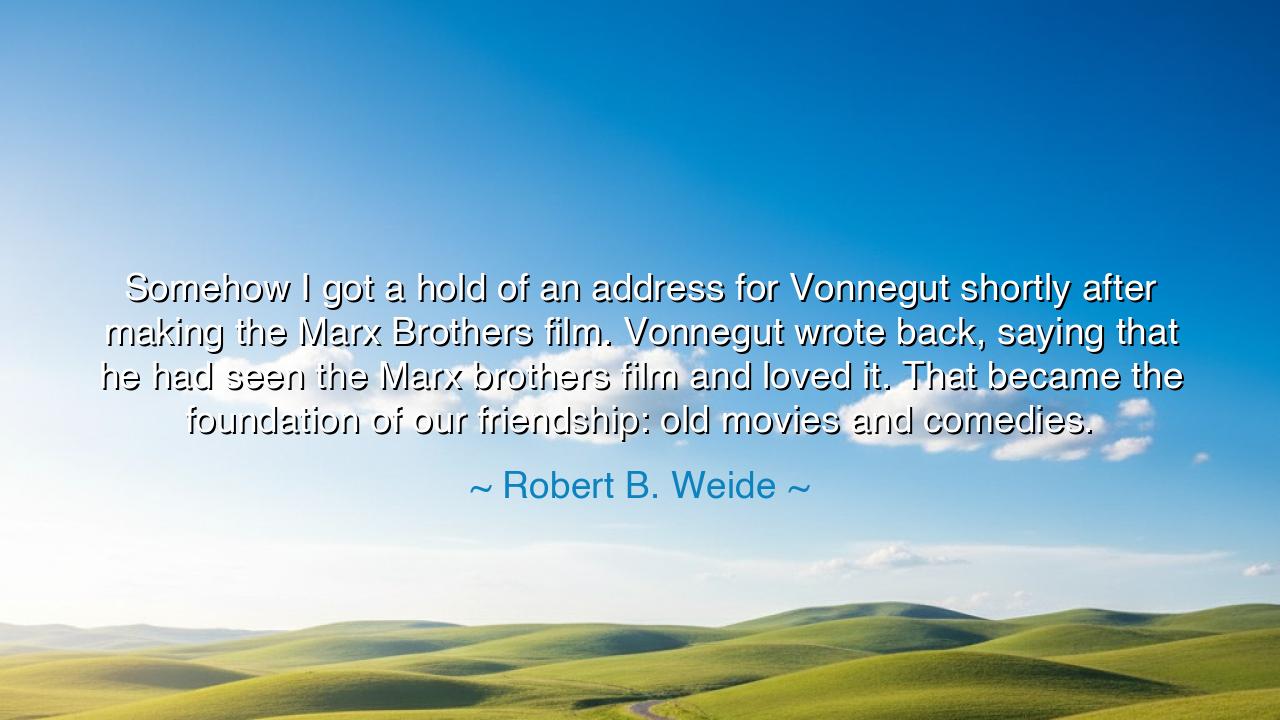
Somehow I got a hold of an address for Vonnegut shortly after
Somehow I got a hold of an address for Vonnegut shortly after making the Marx Brothers film. Vonnegut wrote back, saying that he had seen the Marx brothers film and loved it. That became the foundation of our friendship: old movies and comedies.






The filmmaker and storyteller Robert B. Weide, known for his wit, intellect, and his long friendship with the writer Kurt Vonnegut, once said: “Somehow I got a hold of an address for Vonnegut shortly after making the Marx Brothers film. Vonnegut wrote back, saying that he had seen the Marx Brothers film and loved it. That became the foundation of our friendship: old movies and comedies.” Beneath these modest words lies a profound reflection on the nature of kindred spirits, the serendipity of human connection, and the way shared laughter becomes the bridge between hearts. Weide speaks not only of a friendship between two artists but of something far older and universal—the mysterious way that art and humor unite souls across distance, age, and time.
The meaning of his reflection is simple yet luminous: friendship is not always born of grand gestures or shared struggle. Sometimes it begins with a letter, a laugh, a spark of common joy. In an age where ambition and noise often crowd out sincerity, Weide reminds us that genuine connection grows from shared wonder, from the recognition of beauty in the same things. In this case, it was the laughter of the Marx Brothers, whose comedy—an art of chaos and genius—became the thread between a young filmmaker and a literary giant. Their laughter became a language of its own, and from it, a friendship blossomed that transcended generations.
The origin of this moment lies in humility and courage—the courage to reach out to one’s hero, and the humility of that hero to respond. Weide, still a young artist, dared to send a message into the unknown, not expecting an answer. Vonnegut, the great author of Slaughterhouse-Five and Cat’s Cradle, responded not as an icon, but as a man moved by another’s creative spirit. What began as a note of admiration became an exchange of equals. This, too, is a great truth of friendship: that admiration, when mixed with honesty, gives birth to equality. The old Greek philosophers would have called it philia—the meeting of minds united in pursuit of something beautiful.
The story evokes the memory of another legendary friendship—that of Johann Wolfgang von Goethe and Friedrich Schiller, two towering figures of German literature. Their friendship, too, began in letters, in discussions of poetry and art. They debated, disagreed, and yet, through shared devotion to truth and beauty, they elevated one another. Goethe once said of Schiller, “He made me a better man.” So too did Weide and Vonnegut, through humor and conversation, sharpen one another’s gifts and keep alive the sacred fire of creative companionship. These friendships remind us that art is not only a solitary act—it is communion, and laughter, perhaps the highest form of that communion, is the soul’s acknowledgment of kinship.
There is a quiet heroism in the friendship Weide describes. It resists the loneliness of modern life, the cynicism that often isolates artists and thinkers. In a world obsessed with self-promotion, their friendship was built on appreciation and shared joy. Old films and comedies, relics of another era, became the sacred ground of their bond—a place where the wisdom of laughter preserved something eternal. The Marx Brothers, with their absurdity and anarchy, spoke to both men of a deeper truth: that humor is rebellion, that to laugh is to affirm life in the face of despair. In that laughter, they found not just amusement, but meaning.
Weide’s recollection also reveals the humanity of great souls. Vonnegut, whose writing often balanced satire with compassion, did not place himself above the young filmmaker. Instead, he answered his letter with warmth and openness. That act of kindness sowed the seed of a friendship that would endure decades. It teaches us that no matter how accomplished or learned we become, we must remain reachable, responsive to the curiosity and enthusiasm of others. For greatness that forgets humility becomes empty.
The lesson, then, is this: cherish the moments of shared laughter, and never underestimate the power of reaching out. Friendship is often born not in grand encounters, but in the simple recognition that another heart beats to the same rhythm as yours. Seek not only to impress others with your achievements, but to connect through what delights you both. Write the letter. Watch the movie. Share the laugh. You never know what destiny might unfold from such small beginnings.
For as Robert B. Weide and Kurt Vonnegut showed, friendship built upon laughter becomes immortal. It transcends generations, it outlives fame, and it leaves behind something greater than art—a testament to the beauty of understanding. So let laughter be your bond with the world, and let admiration turn into dialogue. For when two souls meet over shared joy, the universe itself leans closer, smiling.






AAdministratorAdministrator
Welcome, honored guests. Please leave a comment, we will respond soon